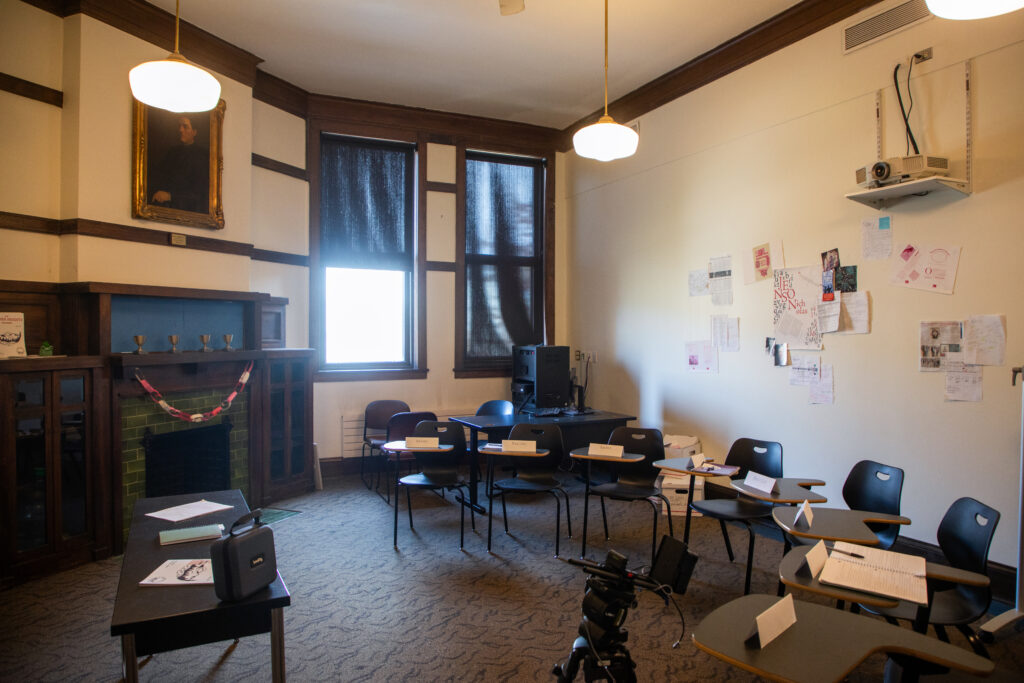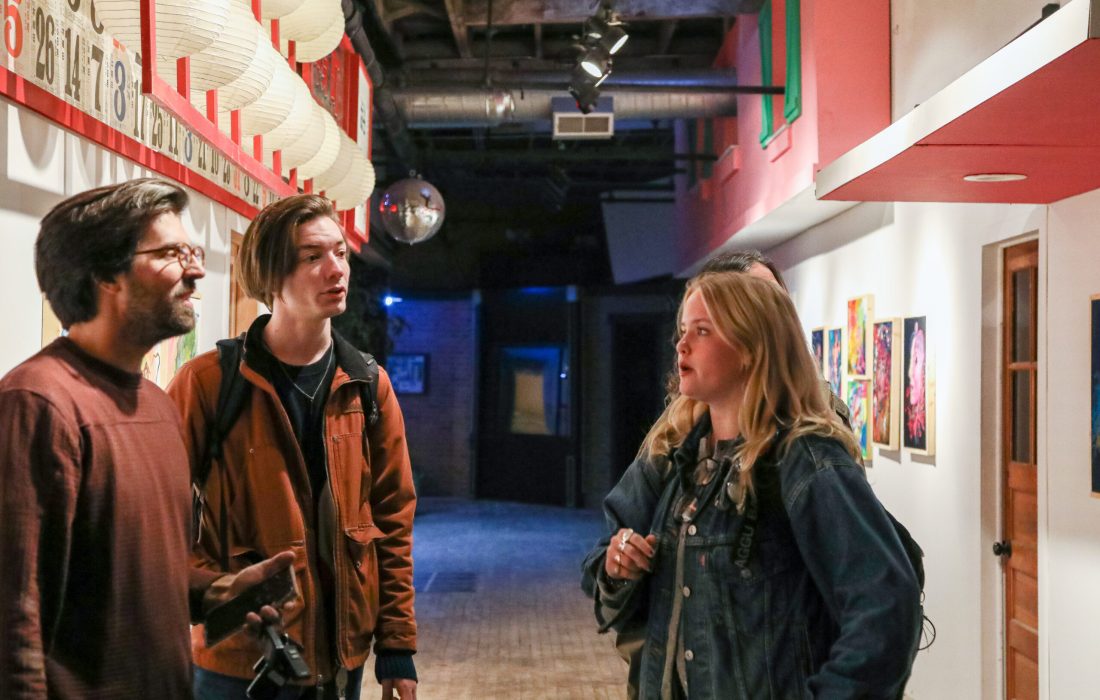Loyola’s collaboration productions unites students to produce three incredible, short films.
Lights, Camera, Community: Behind The Lens on Student Film Productions
Three ambitious films from the School of Communication are set to make waves spring 2025 at the Davis Theater. The student-led films, “Revolution in Print,” “Let’s Kill Case McKenna” and “Strawberry Milkshake” have been in production since last spring.
Each project brings a unique cinematic perspective, blending humor, feminism and community to create entertaining and inspiring films.

“Revolution in Print”
Driven by a knack for change, third-year Sadie Sack’s “Revolution in Print” zooms in on a high school dictatorship.
The short film centers on Caitlin, a first-year excited to join the school magazine, only to discover it’s run by a tyrannical editor-in-chief, Helena. Caitlin rallies the staff to depose Helena and restore the magazine to a collaborative space.
Sack, a film and media production major, said she found inspiration for the film as she was writing it for class.
“It was late at night, and I didn’t know what to write about,” Sack said. “I thought it would be a good opportunity to sum up something interesting I was learning in a fun, comedic way.”
Themes of leadership, community and resistance offer a focused frame on serious political dynamics.
“A lot of the themes are about coming together to evaluate the leadership in a community,” Sack said. “In the play, a lot of the characters reckon with what it means to succeed and what type of leader can lead a group.”
Sack said she wants students to find humor — and hope — in the story.
Fourth-year advertising major Mercedes Heetland is the unit publicist for the production. She said the script’s comedy adds nuance to its exploration of power.
“The script layers humor with genuine stakes,” Heetland said. “It’s a relatable take on what happens when someone abuses their power in a small, close-knit environment.”
The film stands apart for both its storytelling and connection to the local community. Involving individuals from diverse backgrounds, it bridges the gap between campus life and the broader Chicagoland area to highlight local talent.
“We have several Loyola students who are acting in the film as well as people from the Chicagoland area,” Heetland said. “One of our actresses acted on She-Hulk.”
Through “Revolution in Print,” Sack said she hopes the audience reflects on the value of collective action in any community — no matter how small.
“When you work together to create leadership that benefits everyone, it can inspire change at a higher level,” Sack said.

“Let’s Kill Case McKenna”
In the gritty, male-dominated world of indie rock, a rebellion by a feminist group takes center stage. “Let’s Kill Case McKenna” is a comedic battle cry for women reclaiming the narrative through raw revenge.
The film follows Cassidy, Fiona and Alice as they exact revenge on the misogynistic indie rock star, Case McKenna.
Madison Luongo, a third-year advertising and public relations major, is the unit publicist for the film. Luongo, director Finley Harrison and writer Josie Staller work at WLUW 88.7, Loyola’s student run radio station, which inspired the story.
“We wanted to add a fun spin on the kind of problems with the Chicago music industry and being a woman in the industry, especially the kind of indie scene,” Luongo said.
“Let’s Kill Case McKenna” moves away from traditional portrayals of women as passive victims of heartbreak. Instead, the female protagonists gain agency and build alliances to dismantle a patriarchal figure.
“Five out of eight of us do not identify as a man,” Luongo said. “It’s female-led and we knew we wanted to take that direction of empowerment, especially for the film to be directed by a woman.”
Harrison said the team utilizes the minimal equipment they have to highlight the film’s intensity.
“Using different little techniques portray different emotions and tones,” Harrison said. “If we have a scene with Case and we want him to appear powerful and intimidating, we can shoot from a lower angle to make him appear larger than the rest of the characters.”
Harrison connected the film to Eliza McLamb’s song “Glitter” — an anthem of feminist resilience. Harrison said the lyrics “I want to kill your boyfriend” tie into the film’s revenge plot and capture the three main characters’ raw anger.
“Since I first saw the script, ‘Glitter’ always comes to mind,” Harrison said. “She understands the way that one of her friends is being treated by their partner is not what love is. I feel this for the main characters of the film wholeheartedly.”
“Let’s Kill Case McKenna” is a celebration of women’s strength, solidarity and the power of collaboration — both in front of and behind the camera.

“Strawberry Milkshake”
The journey of “Strawberry Milkshake” has been nothing short of heartwarming, from its grassroots fundraising to familial on set spirit.
The rom-com follows a dedicated baker named Carmen who’s married to her work — and constantly crossing paths with insufferable men.
As she juggles impossible standards and her quest to secure a date for her best friend’s wedding, Carmen questions what truly matters in a relationship and discovers truths about love, friendship and herself.
Fourth-year film and digital media major Calista Cardenas said she loosely drew inspiration for the synopsis of “Strawberry Milkshake” from her life.
“I initially wrote ‘Strawberry Milkshake’ for my film and television class,” Cardenas said. “I wanted Carmen to be not so much similar to me, but hopefully have similar characteristics that people can relate to in the adult world, but also the dating world.”
While the film carries a sweet and lighthearted tone, Cardenas and the director, Jillian Green, said they ensured it also tackled the serious issue of representation, amplifying minority voices and creating visibility for women of color.
“We didn’t have representation growing up,” Cardenas said. “So it’s really important for me to write this film and for her to direct it. To put that representation out and have women of color and women in general just feel seen and know that their frustrations and their feelings are valid through it all — regardless of what relationships that they’re in or what things that they’re pursuing in their life.”
During pre-production, the crew raised $2,625 to support the film. This included over $600 from a fundraiser with Lickity Split Ice Cream, who also contributed 20% of a day’s sales, amounting to $125.
Cardenas said she wanted the film’s name to reflect how things evolve when they take on a new form.
“The milkshake serves as a symbol of Carmen’s character transforming from the beginning of the film to the end of the film,” Cardenas said. “The milkshake is, in the beginning, associated with a not-so-great memory surrounding dating and a partner that she had. But by the end of the film, she reclaims the milkshake and has now associated it with friends and good memories.”
The film’s sweetness derives from the crew’s dedication — a student-driven labor of love.
“We’ve had 12-hour days and 5 a.m. starts, and even still, the energy on set is upbeat,” Riley said. “No one is getting paid to be here. People are here because they love their craft.”
The uniquely collaborative atmosphere has defined the production, according to Mira Riley, the unit publicist.
“I’ve never worked on a film project before, so I have nothing to compare ‘Strawberry Milkshake’ to, but I wouldn’t even if I could,” Riley wrote in an email to The Phoenix. “There’s something so special and beautiful about seeing so many dreams blend together to truly make this film something meaningful and sweet.”
By the end of the film, Cardenas said she wants to show students joy can be found in platonic relationships, without the constant pressure to seek romantic love elsewhere. Rom-coms can celebrate the love between friends just as much as the love between partners.
“You don’t need certain relationships, specifically romantic relationships, to have an interesting life or to be happy or to feel fulfilled or to be checking off the boxes in your life,” Cardenas said. “With partners, they can come and go, but I think friendships are really what builds your own character.”
As they wrap up and prepare to edit, Riley said students should support the May showcase because of a surprise cameo.
From tackling the complexities of leadership in “Revolution in Print,” to reclaiming power in the music industry with “Let’s Kill Case McKenna” and exploring love in “Strawberry Milkshake,” these student-led films embody communal creative spirit.
Each project balances thoughtful storytelling with humor and heart to reflect the dedication of their student creators. As these films head to the Davis Theater in spring 2025, they promise to celebrate the power of collaboration and student-driven artistry.
Editor’s Note: Finley Harrison is a regular contributor to The Loyola Phoenix.
-

Noman is a first-year neuroscience and English double major. When not reviewing books or writing about music, Noman enjoys reading, writing poetry, drinking coffee, and watching Young Sheldon. She loves exploring new narratives and capturing the heart of campus stories with a focus on culture and the arts.
View all posts
Topics
Get the Loyola Phoenix newsletter straight to your inbox!


